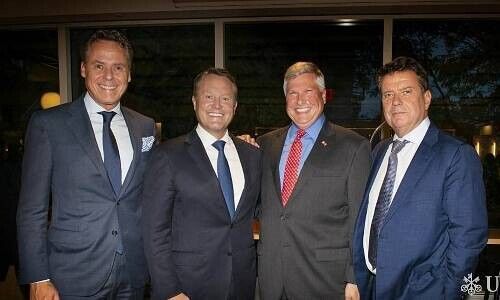UBS's Fizzling PR Campaign to Boost its Share Price
Handsome profits, takeovers, and PR tours by the big bosses with major investors have not been able to significantly increase UBS's market valuation. The latest effort has also shown little traction so far.
The jangling of change you are hearing is UBS is trying to win the favor of investors. As the bank announced Tuesday, it proposes increasing the ordinary dividend for 2022 by 4 cents to $0.55, or ten percent, amounting to additional expenses of around $140 million. That ain't chump change.
At the same time, the bank announced it will likely spend more than the initially projected $5 billion on share buybacks this year, and gradually increase distributions in coming years as well.
Shaken, Not Stirred
The timing was unfortunate, however, as markets were shaken by higher-than-expected inflation figures in the US. To be sure, over the trading session, the share price was at times up by around one percent. Even so, UBS shares were trading at a price-to-book ratio of 0.95 percent leaving its market value below its actual value.
It is hardly to be expected that this will change so quickly given the difficult asset management environment and that things will turn on a dime. Today, the shares were again trading in the red. In all, this appears to have left UBS investors feeling like a James Bond martini. Shaken, not stirred, by developments.
Seeking Respect
At the same time, UBS under new president Colm Kelleher has intensified its efforts to achieve what the institution considers to be a more appropriate valuation. According to reports, UBS's board of directors believes the bank's shares should be trading at twice their book value.
Like Rodney Dangerfield who got «No respect», as his famous comedy routine goes, Kelleher and CEO Ralph Hamers were seeking just that; respect from fund behemoths such as Capital Group, T. Rowe Price, Wellington, and Fidelity. To that end, they went on tour in June, as finews.com reported, to deliver their valuation pitch to those influential investment firms.
A recent Linkedin post by outgoing co-asset management chief Tom Naratil shows that Kelleher and Hamers were recently on tour again in the US in a likely encore of their June road show. New UBS CFO Sarah M. Youngwood also appeared in New York yesterday, at an investor conference hosted by British bank Barclays, where she fielded questions from financial professionals.
Tactical Shift
It was up to Youngwood to discuss the aborted takeover of American fintech Wealthfront, which was canceled at the beginning of September. UBS will now once again focus on organic growth again, Youngwood explained, with UBS now refraining from stoking its stock market value with takeovers, closing down that particular avenue of lifting the share price.
In what must be a frustrating scenario for UBS, they presented a respectable half-year result under the circumstances, and yet the share price temporarily fell by more than 6 percent. Hamers and his management team could only offer a cautiously optimistic outlook for the business to counter this.
By now, it must be clear to most investors that UBS's fate is not fully in its own hands, and that the economic and political environment currently has an enormous influence.
Is a Power Shift Underway?
In what is likely to be particularly galling for Kelleher, that premise does not apply equally to all major banks active in wealth management. US competitor Morgan Stanley, for example, where Kelleher served for decades, trades at a price-to-book ratio of almost 1.6, a fact to which market observers make biting references. In light of that, it makes sense that Morgan Stanley currently sees potential in takeovers and is ironically following the very course that UBS just rejected.
Hamers and his management team likely don't have much time left to find the right recipe for a better valuation. In the meantime, influential media such as the «Financial Times» (behind paywall) are reporting on his allegedly weakened position following the cancellation of the Wealthfront deal. At the same time, Kelleher is increasingly putting his stamp on Switzerland's largest bank.




























